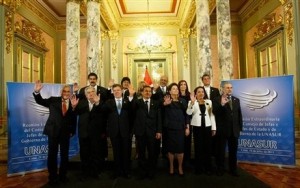A Historic Step to be Taken Today: Could UNASUR Finalize Plans for an Economic Emergency Fund?
Today, August 12, the Union of South American Nations (UNASUR) will continue to discuss the possibility of creating a USD 20 billion emergency fund to “assist nations that might experience capital flight if a new global economic crisis increases.”
Talks over an alternative to the International Monetary Fund were first discussed during an emergency UNASUR meeting in Lima on July 28, when the attending heads of state to Peruvian President Ollanta Humala’s inauguration expressed fears over the United States possibly defaulting on its national debt. Discussions were then carried into the August 8 UNASUR meeting when economic ministers met, once again, in the Peruvian capital to discuss the unstable economic climate surrounding the United States and Europe. Panic over the unfolding financial crisis, highlighted by the United States credit downgrade that same day from AAA to AA+ by the credit rating agency Standard and Poor, inspired what an Argentinian delegate later described as “a realization in the region, after a long period of time, that the problems coming from the North can cause external problems that can affect our economies.”
In what Venezuelan Foreign Relations Minister, Nicolas Maduro, described on August 8 as a “historic” step, member countries of UNASUR might today finally further their integration by jointly preparing to protect the region from a new global crisis.
The proposed fund would be modeled after the Fondo Latino-Americano de Reservas (FLAR), a USD 4 billion monetary pool of foreign currency reserves from the five Andean nations plus Costa Rica and Uruguay, created to help member nations should they ever run into a balance of payment problem incurred by a financial crisis. The plan for a new fund, first proposed by Colombia and Peru, would protect the economies of UNASUR members—an estimated USD 700 billion in foreign currency reserves—from a deteriorating United States and European economic calamity. Another alternative to be discussed during the meeting today will be the possibility of an expansion of FLAR membership, perhaps including Brazil, which in 2009 pledged USD 10 billion in reserves to the IMF, and which could prove a powerful new funder for organizations and reserves looking for additional contributions. Thus far, no comments have been made from any of the representatives that are meeting today, as a majority of the names have been kept secret in order to protect the serious nature of the on-going discussions.


